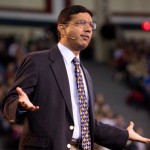D'Souza Shakes Up Ayn Rand World

Dinesh D’Souza has recently been doing a lot of harm to the conservative movement, as well as the country at large. His new book and recent cover story for Forbes claimed that President Obama had the operating mentality of a “Luo tribesman.” Despite being an embarrassment, D’Souza’s history of making ridiculous arguments is leading to a small amount of good in the world. His writings, and the reaction against them, have helped spur a call for glasnost within, of all places, the cloistered world of Ayn Rand Objectivists.
After her death and the founding of the Ayn Rand Institute (ARI), the Objectivist movement continued Rand’s circle-the-wagons mentality towards the outside world, purging individuals who deviated from orthodox Objectivism.
Recently though, a member of ARI’s board of directors, Dr. John McCasky, resigned after taking controversial positions on a recently published Objectivist text on the history of science. McCasky had suggested that the book endorsed views of history that “differ from those given by academic researchers working on the history of science and often by the scientists themselves”; in effect arguing that the book was not accurate.
The Objectivists came down on McCasky. Leonard Peikoff, founder of ARI and the legal heir to Rand's estate is generally considered Rand's "intellectual heir". Peikoff, a supporter of the book in question, pulled rank on McCasky, reminding him that nothing that Peikoff endorsed could be wrong, since by definition, he is the heir to Ayn Rand’s “Objective” view of the world.
This led Robert Tracinski, an Objectivist who had also been written out of the movement earlier, to write a long critique against the practices and methods of the ARI. His essay covered the long history of Objectivists reaching conclusions at odds with reality, a history in which Dinesh D'Souza surprisingly plays a prominent role.
One of the peculiar beliefs of Objectivsts during the Bush administration is that Republicans intended to turn America into a Christian theocracy. A key piece of evidence they used to prove this was Dinesh D’Souza’s 2004 book, The Enemy at Home. The book argued that America was attacked on 9/11 because our society was too liberal and that the solution was for America to emulate the religious attitudes of the same Islamists who attacked.
Objectivist Elan Journo wrote on ARI’s blog in 2009: “angry though some conservatives may be with D’Souza, the implications of his theocratic program have not caused him to be drummed out of the movement… Indeed, D’Souza himself has lost none of his superstar cachet.”
Journo cites two reviews by conservatives to make this point, one by Mark Steyn and one by Jonah Goldberg. While Goldberg is sympathetic to D’Souza, Steyn’s review is negative and argues that the book is “is the geopolitical If I Did It. As you may recall, that was the title of the artful O.J. Simpson tome.” Hardly a strong endorsement.
Tracinski notes what the Objectivist movement completely missed when discussing D’Souza’s book, that while there may have been moderately favorable coverage from one author, one the whole, this was not the case:
Journo cites, as evidence of conservative sympathy for D'Souza's argument, that "National Review's website published D'Souza's detailed, four-part reply to his critics." He neglects to mention that this was followed by NRO's own online "symposium," whose title was "Rejecting a Thesis"—National Review's writers rejecting D'Souza's thesis.
(The symposium can be read here.)
If even one potential Objectivist reads Tracinski’s essay and develops doubts about the current intellectual health of the movement he wants to join, then D’Souza’s outrageous arguments and the response they provoked will have an unintended positive impact.
It should be noted though that part of Elan Journo’s original blog post is unfortunately correct. Despite D’Souza’s having his ideas rejected by the movement in 2004, it seems that in 2010, he is still in good enough standing today to be endorsed by Forbes and Newt Gingrich.